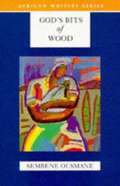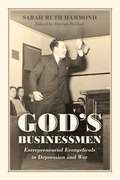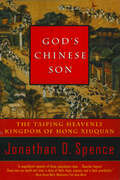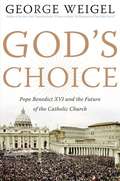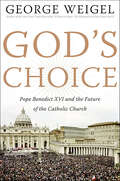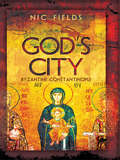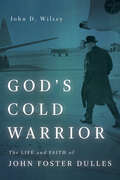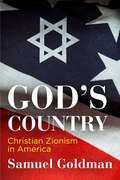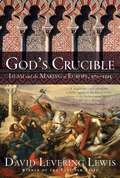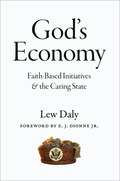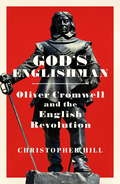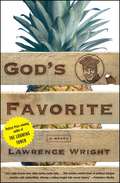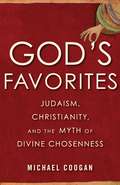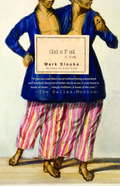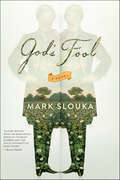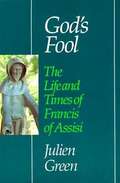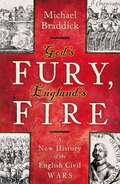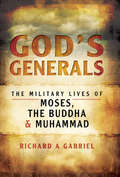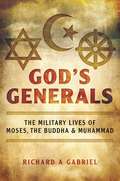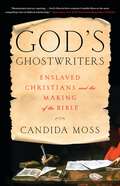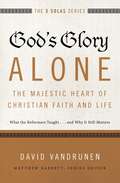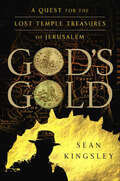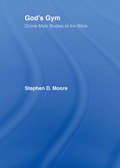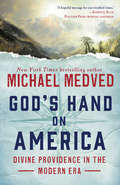- Table View
- List View
God's Bits of Wood (African Writers Series)
by Sembene Ousmane Francis PriceThis novel, set during the Dakar-Niger railway strike of 1947-48, is written from the workers' perspective. Ousmane presents realistic and moving portraits of people under pressure, and people who are forced to confront unpleasant choices.
God's Businessmen: Entrepreneurial Evangelicals in Depression and War
by Darren Dochuk Sarah Ruth HammondThe evangelical embrace of conservatism is a familiar feature of the contemporary political landscape. What’s less well-known, however, is that the connection predates the Reagan revolution, going all the way back to the Depression and World War II. Evangelical businessmen at the time were quite active in opposing the New Deal—on both theological and economic grounds—and in doing so claimed a place alongside other conservatives in the public sphere. Like previous generations of devout laymen, they self-consciously merged their religious and business lives, financing and organizing evangelical causes with the kind of visionary pragmatism that they practiced in the boardroom. In God’s Businessmen, Sarah Ruth Hammond explores not only these men’s personal trajectories but also those of the service clubs and other institutions that, like them, believed that businessmen were God’s instrument for the Christianization of the world. Hammond presents a capacious portrait of the relationship between the evangelical business community and the New Deal—and in doing so makes important contributions to American religious history, business history, and the history of the American state.
God's Chinese Son: The Taiping Heavenly Kingdom of Hong Xiuquan
by Jonathan D. Spence"A magnificent tapestry . . . a story that reaches beyond China into our world and time: a story of faith, hope, passion, and a fatal grandiosity."--Washington Post Book World Whether read for its powerful account of the largest uprising in human history, or for its foreshadowing of the terrible convulsions suffered by twentieth-century China, or for the narrative power of a great historian at his best, God's Chinese Son must be read. At the center of this history of China's Taiping rebellion (1845-64) stands Hong Xiuquan, a failed student of Confucian doctrine who ascends to heaven in a dream and meets his heavenly family: God, Mary, and his older brother, Jesus. He returns to earth charged to eradicate the "demon-devils," the alien Manchu rulers of China. His success carries him and his followers to the heavenly capital at Nanjing, where they rule a large part of south China for more than a decade. Their decline and fall, wrought by internal division and the unrelenting military pressures of the Manchus and the Western powers, carry them to a hell on earth. Twenty million Chinese are left dead.
God's Choice: Pope Benedict XVI and the Future of the Catholic Church
by George WeigelWeigel introduces us to Pope Benedict XVI. What was this man thinking when he knew that he might be elected? How did the process work? What is the historical significance for the Catholic Church? What is John Paul II's legacy? Although rich with detail, this book is a lucid and fascinating consideration of the monumental events of 2005.
God's Choice: Pope Benedict XVI and the Future of the Catholic Church
by George WeigelGeorge Weigel's New York Times bestselling biography of Pope John Paul II, Witness to Hope, set the standard by which all portraits of the modern papacy are now measured. With God's Choice, he gives us an extraordinary chronicle of the rise of Pope Benedict XVI as well as an unflinching view of the Catholic Church at the dawn of a new era.When John Paul II lapsed into illness for the last time, people flocked from all over the world to pray outside his apartment. He had become a father figure to millions in a world bereft of strong paternal examples, and those millions now felt orphaned. After more than twenty-six years of John Paul II's guidance, the Catholic Church is entering a new age, with its bedrock traditions intact but with pressing questions to address in a rapidly changing world. Beginning with the story of John Paul's final months, God's Choice offers a remarkable inside account of the conclave that produced Benedict XVI as the next pope, drawing on George Weigel's unrivaled access to this complex event.Weigel also incisively surveys the current state of the Church around the world: its thriving populations in Africa, Latin America, and parts of the post-communist world; its collapse in western Europe; its continued struggles in Asia; and the vibrancy of many aspects of Catholic life in the United States, even as the Church in America struggles to overcome its recent experience of scandal.Reflecting on John Paul II's greatness, drawing on firsthand interviews to paint an intimate portrait of the new Pope, and boldly assessing the Church's current condition, God's Choice is an invaluable book for anyone seeking to understand the Catholic future and the larger human future the Church will help to shape.
God's City: Byzantine Constantinople
by Nic FieldsByzantium. Was it Greek or Roman, familiar or hybrid, barbaric or civilized, Oriental or Western? In the late eleventh century Constantinople was the largest and wealthiest city in Christendom, the seat of the Byzantine emperor, Christs vice-regent on earth, and the center of a predominately Christian empire, steeped in Greek cultural and artistic influences, yet founded and maintained by a Roman legal and administrative system. Despite the amalgam of Greek and Roman influences, however, its language and culture was definitely Greek. Constantinople truly was the capital of the Roman empire in the East, and from its founding under the first Constantinus to its fall under the eleventh and last Constantinus the inhabitants always called themselves Romaioi, Romans, not Hellniks, Greeks. Over its millennium long history the empire and its capital experienced many vicissitudes that included several periods of waxing and waning and more than one golden age.Its political will to survive is still eloquently proclaimed in the monumental double land walls of Constantinople, the greatest city fortifications ever built, on which the forces of barbarism dashed themselves for a thousand years. Indeed, Byzantium was one of the longest lasting social organizations in history. Very much part of this success story was the legendary Varangian Guard, the lite body of axe-bearing Northmen sworn to remain loyal to the true Christian emperor of the Romans. There was no hope for an empire that had lost the will to prosecute the grand and awful business of adventure. The Byzantine empire was certainly not of that stamp.
God's Cold Warrior: The Life and Faith of John Foster Dulles (Library of Religious Biography (LRB))
by John D. WilseyWhen John Foster Dulles died in 1959, he was given the largest American state funeral since Franklin Delano Roosevelt&’s in 1945. President Eisenhower called Dulles—his longtime secretary of state—&“one of the truly great men of our time,&” and a few years later the new commercial airport outside Washington, DC, was christened the Dulles International Airport in his honor. His star has fallen significantly since that time, but his influence remains indelible—most especially regarding his role in bringing the worldview of American exceptionalism to the forefront of US foreign policy during the Cold War era, a worldview that has long outlived him. God&’s Cold Warrior recounts how Dulles&’s faith commitments from his Presbyterian upbringing found fertile soil in the anti-communist crusades of the mid-twentieth century. After attending the Oxford Ecumenical Church Conference in 1937, he wrote about his realization that &“the spirit of Christianity, of which I learned as a boy, was really that of which the world now stood in very great need, not merely to save souls, but to solve the practical problems of international affairs.&” Dulles believed that America was chosen by God to defend the freedom of all those vulnerable to the godless tyranny of communism, and he carried out this religious vision in every aspect of his diplomatic and political work. He was conspicuous among those US officials in the twentieth century that prominently combined their religious convictions and public service, making his life and faith key to understanding the interconnectedness of God and country in US foreign affairs.
God's Country: Christian Zionism in America (Haney Foundation Series)
by Samuel GoldmanThe United States is Israel's closest ally in the world. The fact is undeniable, and undeniably controversial, not least because it so often inspires conspiracy theorizing among those who refuse to believe that the special relationship serves America's strategic interests or places the United States on the right side of Israel's enduring conflict with the Palestinians. Some point to the nefarious influence of a powerful "Israel lobby" within the halls of Congress. Others detect the hand of evangelical Protestants who fervently support Israel for their own theological reasons. The underlying assumption of all such accounts is that America's support for Israel must flow from a mixture of collusion, manipulation, and ideologically driven foolishness.Samuel Goldman proposes another explanation. The political culture of the United States, he argues, has been marked from the very beginning by a Christian theology that views the American nation as deeply implicated in the historical fate of biblical Israel. God's Country is the first book to tell the complete story of Christian Zionism in American political and religious thought from the Puritans to 9/11. It identifies three sources of American Christian support for a Jewish state: covenant, or the idea of an ongoing relationship between God and the Jewish people; prophecy, or biblical predictions of return to The Promised Land; and cultural affinity, based on shared values and similar institutions. Combining original research with insights from the work of historians of American religion, Goldman crafts a provocative narrative that chronicles Americans' attachment to the State of Israel.
God's Crucible: Islam and the Making of Europe, 570-1215 (Playaway Adult Nonfiction Ser.)
by David Levering Lewis"A furiously complex age; a powerful narrative."--New York Times Book Review, Editor's Choice At the beginning of the eighth century, the Arabs brought a momentous revolution in power, religion, and culture to Dark Ages Europe. David Levering Lewis's masterful history begins with the fall of the Persian and Roman empires, followed by the rise of the prophet Muhammad and the creation of Muslim Spain. Five centuries of engagement between the Muslim imperium and an emerging Europe followed, from the Muslim conquest of Visigoth Hispania in 711 to Latin Christendom's declaration of unconditional warfare on the Caliphate in 1215. Lewis's narrative, filled with accounts of some of the greatest battles in world history, reveals how cosmopolitan, Muslim al-Andalus flourished--a beacon of cooperation and tolerance between Islam, Judaism, and Christianity--while proto-Europe, defining itself in opposition to Islam, made virtues out of hereditary aristocracy, religious intolerance, perpetual war, and slavery. A cautionary tale, God's Crucible provides a new interpretation of world-altering events whose influence remains as current as today's headlines. Some images in the ebook are not displayed owing to permissions issues.
God's Economy: Faith-based Initiatives and the Caring State
by Lew DalyPresident Obama has signaled a sharp break from many Bush Administration policies, but he remains committed to federal support for religious social service providers. Like George W. Bush's faith-based initiative, though, Obama's version of the policy has generated loud criticism--from both sides of the aisle--even as the communities that stand to benefit suffer through an ailing economy. God's Economy reveals that virtually all of the critics, as well as many supporters, have long misunderstood both the true implications of faith-based partnerships and their unique potential for advancing social justice. Unearthing the intellectual history of the faith-based initiative, Lew Daly locates its roots in the pluralist tradition of Europe's Christian democracies, in which the state shares sovereignty with social institutions. He argues that Catholic and Dutch Calvinist ideas played a crucial role in the evolution of this tradition, as churches across nineteenth-century Europe developed philosophical and legal defenses to protect their education and social programs against ascendant governments. Tracing the influence of this heritage on the past three decades of American social policy and church-state law, Daly finally untangles the radical beginnings of the faith-based initiative. In the process, he frees it from the narrow culture-war framework that has limited debate on the subject since Bush opened the White House Office for Faith-Based and Community Initiatives in 2001. A major contribution from an important new voice at the intersection of religion and politics, God's Economy points the way toward policy-making that combines strong social support with a new moral focus on the protection of families and communities.
God's Englishman
by Christopher HillThe classic, bestselling biography of one of the most controversial figures in British history from 'One of the finest historians of the age' The Times Literary SupplementFrom Fenland farmer and humble backbencher to stalwart of the good old cause and the New Model Army, Oliver Cromwell became the key figure of the Commonwealth, and ultimately Lord Protector. In this fascinating and insightful biography, Christopher Hill reveals Cromwell's life from his beginnings in Huntingdonshire to his brutal end. Hill brings all his considerable knowledge of the period to bear on the relationships God's Englishman had with God and England, giving an unprecedented insight vital to understanding Cromwell.
God's Englishman: Oliver Cromwell And The English Revolution (Pelican Ser.)
by Christopher HillThe classic, bestselling biography of one of the most controversial figures in British history from 'One of the finest historians of the age' The Times Literary SupplementFrom Fenland farmer and humble backbencher to stalwart of the good old cause and the New Model Army, Oliver Cromwell became the key figure of the Commonwealth, and ultimately Lord Protector. In this fascinating and insightful biography, Christopher Hill reveals Cromwell's life from his beginnings in Huntingdonshire to his brutal end. Hill brings all his considerable knowledge of the period to bear on the relationships God's Englishman had with God and England, giving an unprecedented insight vital to understanding Cromwell.
God's Favorite: A Novel
by Lawrence WrightIn this fascinating work of historical fiction, Pulitzer Prize-winning author Lawrence Wright captures all the gripping drama and black humor of Panama during the final, nerve-racking days of its legendary dictator, Manuel Antonio Noriega.It is Christmas 1989, and Tony Noriega's demons are finally beginning to catch up with him. A former friend of President Bush, Fidel Castro, and Oliver North, this universally reviled strongman is on the run from the U.S. Congress, the Justice Department, the Colombian mob, and a host of political rivals. In his desperation, he seeks salvation from any and all quarters -- God, Satan, a voodoo priest, even the spirits of his murdered enemies. But with a million-dollar price on his head and 20,000 American soldiers on his trail, Noriega is fast running out of options. Drawn from a historical record more dramatic than even the most artful spy novel, God's Favorite is a riveting and darkly comic fictional account of the events that occurred in Panama from 1985 to the dictator's capture in 1989. With an award-winning journalist's eye for detail, Lawrence Wright leads the reader toward a dramatic face-off in the Vatican embassy, where Noriega confronts his psychological match in the papal nuncio.
God's Favorites: Judaism, Christianity, and the Myth of Divine Chosenness
by Michael CooganA noted biblical scholar explores how the claim of divine choice has been used from ancient times to the present to justify territorial expansion and prejudice.The Bible describes many individuals and groups as specially chosen by God. But does God choose at all? Michael Coogan explains the temporally layered and allusive storytelling of biblical texts and describes the world of the ancient Near East from which it emerged, laying bare the power struggles, the acts of vengeance, and persecutions made sacred by claims of chosenness. Jumping forward to more modern contexts, Coogan reminds us how the self-designation of the Puritan colonizers of New England as God's new Israel eventually morphed, in the United States, into the self-justifying doctrines of manifest destiny and American exceptionalism. In contemporary Israel, both fundamentalist Zionists and their evangelical American partners cite the Jews' status as God's chosen people as justification for taking land--for very different ends. Appropriated uncritically, the Bible has thus been used to reinforce exclusivity and superiority, with new myths based on old myths.Finally, in place of the pernicious idea of chosenness, Coogan suggests we might instead focus on another key biblical concept: taking care of the immigrant and the refugee, reminding the reader of the unusual focus on the vulnerable in both the Hebrew Bible and New Testament.
God's Fool
by Mark SloukaBorn attached at the chest, Chang and Eng were considered a marvel, an omen, an act of God, evidence of His glory or proof of His wrath. Uniquely cursed, enslaved to one another for life, they were a joke of nature variously feared and abhorred, disturbing our most basic assumptions about the human condition. Mark Slouka's dazzling achievement in God's Fool is the ease and compassion with which he draws the story of one human being from this ghastly predicament. Looking beyond the twins' physical connection, he imagines one man's life of ordinary grace and suffering, longing and resistance, and the ties of love, as well as of blood, that bind and redeem us all. By any standard, theirs is a history of epic variety and drama. Their birth, to an illiterate fishmonger, sent midwives screaming from the room. Condemned to death, they survived to be brought, at the age of thirteen, to the Royal Palace in Bangkok for an audience with King Rama III. At seventeen, laboring as merchants on the Meklong River, they saw their world erased by a typhoon. Consigned for three hundred pounds to an opium trader by their mother, who was desperate to ensure their survival, they sailed for Europe. There they entertained kings and counselors in salons and drawing rooms from Brussels to Rome, and, in Paris, met the woman who would divide them as no surgeon ever could.When the culture that had lifted them up inevitably cast them down, they landed in the flophouses of London, where, penniless and starving, they were discovered by Phineas T. Barnum, who packed them off to America along with an assortment of bearded ladies and two-headed calves, albino beauties and dog boys, German midgets and twelve-fingered flute players. Leaving Barnum at the height of their fame to take a last stab at normal life, they settled in North Carolina, where, despite the tensions growing between them, they found, for a time, tranquillity as farmers and slave owners, marrying a pair of sisters and fathering, between them, twenty children. Their peace, however, would prove to be short-lived. As the Civil War drew closer, and their world began to tilt, they would first turn against each other and then, faced with a trial unlike any they had ever known, draw together once more. No longer young, they set off to find the war, and to save what could be saved. It would be there, on that very real battlefield, that Chang would enact his final, terrifying battle with fate.Sweeping and intimate, vibrant and austere, God's Fool is a novel of soaring ambition and accomplishment from a fiercely gifted storyteller.From the Hardcover edition.
God's Fool: A Novel (Vintage Contemporaries Ser.)
by Mark Slouka"If you can read [God’s Fool] without being astonished and touched, then you’d better check to see if your heart is made of stone…simply brilliant. A book of the year." —Dallas Morning NewsBorn attached at the chest, Chang and Eng were considered a marvel, an act of God. By any standard, theirs is a history of epic variety and drama. Mark Slouka recounts their tumultuous story, from the docks of Vietnam to American fame, with intimacy and compassion.A Washington Post, San Francisco Chronicle, and Dallas Morning News Best Book of the Year.
God's Fool: The Life of Francis of Assisi
by Julien Green Peter HeineggThis warm, richly detailed biography brings the beloved saint alive in all his human and profoundly spiritual dimensions.
God's Fury, England's Fire: A New History of the English Civil Wars
by Michael BraddickThe sequence of civil wars that ripped England apart in the seventeenth century was the single most traumatic event in this country between the medieval Black Death and the two world wars. Indeed, it is likely that a greater percentage of the population were killed in the civil wars than in the First World War. This sense of overwhelming trauma gives this major new history its title: God’s Fury, England’s Fire. The name of a pamphlet written after the king’s surrender, it sums up the widespread feeling within England that the seemingly endless nightmare that had destroyed families, towns and livelihoods was ordained by a vengeful God – that the people of England had sinned and were now being punished. As with all civil wars, however, ‘God’s fury’ could support or destroy either side in the conflict. Was God angry at Charles I for failing to support the true, protestant, religion and refusing to work with Parliament? Or was God angry with those who had dared challenge His anointed Sovereign?Michael Braddick’s remarkable book gives the reader a vivid and enduring sense both of what it was like to live through events of uncontrollable violence and what really animated the different sides. The killing of Charles I and the declaration of a republic – events which even now seem in an English context utterly astounding – were by no means the only outcomes, and Braddick brilliantly describes the twists and turns that led to the most radical solutions of all to the country’s political implosion. He also describes very effectively the influence of events in Scotland, Ireland and the European mainland on the conflict in England.God’s Fury, England’s Fire allows readers to understand once more the events that have so fundamentally marked this country and which still resonate centuries after their bloody ending.
God's Generals: The Military Lives of Moses, the Buddha & Muhammad
by Richard A. GabrielIt is one of the more startling facts of military history that the founders of three of the four 'great religions'—Judaism, Buddhism, and Islam—were also accomplished field generals with extensive experience in commanding men in battle. One of these, Muhammad, fought eight battles and was wounded twice, once almost fatally. Another, Siddhartha Gautama (later to become the Buddha), witnessed so much battlefield carnage that he suffered a psychological collapse. Moses had become so much a 'god-intoxicated' personality, it is a reasonable suspicion that he, like the Buddha, was murdered. Indeed, had the experiences of these men in war not been so successful, it is quite possible that their achievements as religious leaders would never have occurred. For all three, war and religion were so closely intertwined in their personalities that it is difficult to discern where the influence of one ended and the other began. This book attempts to explore the military lives of Moses, the Buddha and Muhammad, and the role their war experiences played in their religious lives.
God's Generals: The Military Lives of Moses, the Buddha, and Muhammad
by Richard A. GabrielExamines how the military experience of three religious founders shaped their spiritual legacy.It is one of the more startling facts of military history that the founders of three of the four "great religions"-Judaism, Buddhism, and Islam-were also accomplished field generals with extensive experience in commanding men in battle. One of these, Muhammad, fought eight battles and was wounded twice, once almost fatally. Another, Siddhartha Gautama (later to become the Buddha), witnessed so much battlefield carnage that he suffered a psychological collapse. Moses had become so much a "god-intoxicated" personality that it is a reasonable suspicion that he, like the Buddha, was murdered.Indeed, had the experiences of these men in war not been so successful, it is quite possible that their achievements as religious leaders would never have occurred. For all three, war and religion were so closely intertwined in their personalities that it is difficult to discern where the influence of one ended and the other began.This book attempts to explore the military lives of Moses, the Buddha, and Muhammad, and the role their war experiences played in their religious lives.Skyhorse Publishing, as well as our Arcade imprint, are proud to publish a broad range of books for readers interested in history--books about World War II, the Third Reich, Hitler and his henchmen, the JFK assassination, conspiracies, the American Civil War, the American Revolution, gladiators, Vikings, ancient Rome, medieval times, the old West, and much more. While not every title we publish becomes a New York Times bestseller or a national bestseller, we are committed to books on subjects that are sometimes overlooked and to authors whose work might not otherwise find a home.
God's Ghostwriters: Enslaved Christians and the Making of the Bible
by Candida MossFrom an award-winning biblical scholar, the &“monumental and eye-opening&” story of how enslaved people created, gave meaning to, and spread the message of the New Testament, shaping the very foundations of Christianity in ways both subtle and profound (Reza Aslan). For the past two thousand years, Christian tradition, scholarship, and pop culture have credited the authorship of the New Testament to a select group of men: Matthew, Mark, Luke, John, and Paul. But hidden behind these named and sainted individuals are a cluster of unnamed, enslaved coauthors and collaborators. These essential workers were responsible for producing the earliest manuscripts of the New Testament: making the parchment on which the texts were written, taking dictation, and refining the words of the apostles. And as the Christian message grew in influence, it was enslaved missionaries who undertook the arduous journey across the Mediterranean and along dusty roads to move Christianity to Rome, Spain, and North Africa—and into the pages of history. The impact of these enslaved contributors on the spread of Christianity, the development of foundational Christian concepts, and the making of the Bible was enormous, yet their role has been almost entirely overlooked until now. Filled with profound revelations both for what it means to be a Christian and for how we read individual texts themselves, God&’s Ghostwriters is a groundbreaking and rigorously researched book about how enslaved people shaped the Bible, and with it all of Christianity.
God's Glory Alone---The Majestic Heart of Christian Faith and Life: What the Reformers Taught...and Why It Still Matters
by Matthew Barrett David VandrunenHistorians and theologians have long recognized that at the heart of the sixteenth-century Protestant Reformation were five declarations, often referred to as the ‘solas’: sola scriptura, solus Christus, sola gratia, sola fide, and soli Deo gloria. These five statements summarize much of what the Reformation was about, and they distinguish Protestantism from other expressions of the Christian faith. Protestants place ultimate and final authority in the Scriptures, acknowledge the work of Christ alone as sufficient for redemption, recognize that salvation is by grace alone through faith alone, and seek to do all things for God’s glory. In God’s Glory Alone—The Majestic Heart of Christian Faith and Life, renowned scholar David VanDrunen looks at the historical and biblical roots of the idea that all glory belongs to God alone. He examines the development of this theme in the Reformation, in subsequent Reformed theology and confessions, and in contemporary theologians who continue to be inspired by the conviction that all glory belongs to God. Then he turns to the biblical story of God's glory, beginning with the pillar of cloud and fire revealed to Israel, continuing through the incarnation, death, and exaltation of the Lord Jesus Christ, and culminating in Christ's Second Coming and the glorification of his people. In light of these wonderful biblical themes he concludes by addressing several of today's great cultural challenges and temptations—such as distraction and narcissism—and reflecting on how commitment to God's glory alone fortifies us to live godly lives in this present evil age.
God's Gold: A Quest for the Lost Temple Treasures of Jerusalem
by Sean KingsleyIn 70 AD, the Roman emperor Vespasian and his son Titus plundered the great Temple of Jerusalem, claiming for themselves a priceless hoard. The golden candelabrum, silver trumpets, the bejeweled Table of the Divine Presence—the central icons of the Jewish faith—were cast adrift in Mediterranean lands and exposed to centuries of turbulent history and the rule of four different civilizations. Only an intriguing trail of clues remains to betray the treasure's ever-changing destiny—a trail eminent archaeologist Dr. Sean Kingsley has followed on one of the most remarkable quests of this or any other age: the search for the final resting place of God's gold.
God's Gym: Divine Male Bodies of the Bible
by Stephen MooreIn this strikingly original work, Stephen Moore considers God's male bodies--the body of Yahweh in the Hebrew Bible, and the Father of Jesus Christ, and Jesus himself in the New Testament--and our obsessive earthly quest for a perfect human form. God's Gym is about divinity, physical pain, and the visions of male perfectability. Weaving together his obsession with human anatomy and dissection, an interest in the technologies of torture, the cult of physical culture, and an expert knowledge of biblical criticism, Moore explains the male narcissism at the heart of the biblical God. God's Gym is an intensely personal book, brimming with our culture's phobias and fascinations about male perfectability.
God's Hand on America: Divine Providence in the Modern Era
by Michael MedvedThe national radio host and bestselling author of The American Miracle reveals the happy accidents, bizarre coincidences, and flat-out miracles that continue to shape America&’s destiny. &“A hopeful message for our troubled times . . . Michael Medved has an eye for a story, and a preternatural gift for telling it in beguiling ways.&”—Joseph J. Ellis, Pulitzer Prize and National Book Award–winning author of Founding Brothers Has God withdrawn his special blessing from the United States? Americans ponder that painful question in troubled times, as we did during the devastation of the Civil War and after the assassinations of the &’60s, and as we do in our present polarization. Yet somehow—on battlefields, across western wilderness, and in raucous convention halls—astounding events have reliably advanced America, restoring faith in the Republic&’s providential protection. In this provocative historical narrative, Michael Medved brings to life ten haunting tales that reveal this purposeful pattern, including: • A near-fatal carriage accident forces Lincoln&’s secretary of state into a canvas-and-steel neck brace that protects him from a would-be assassin&’s knife thrusts, allowing him two years later to acquire Alaska for the United States. • A sudden tidal wave of Russian Jewish immigration, beginning in 1881, coincides with America&’s rise to world leadership, fulfilling a biblical promise that those blessing Abraham&’s children will themselves be blessed. • Campaigning for president, Theodore Roosevelt takes a bullet in the chest, but a folded speech in his jacket pocket slows its progress and saves his life. • At the Battle of Midway, U.S. planes get lost over empty ocean and then miraculously reconnect for five minutes of dive-bombing that wrecks Japan&’s fleet, convincing even enemy commanders that higher powers intervened against them. • A behind-the-scenes &“conspiracy of the pure of heart&” by Democratic leaders forces a gravely ill FDR to replace his sitting vice president—an unstable Stalinist—with future White House great Harry Truman. These and other little-known stories build on themes of The American Miracle, Medved&’s bestseller about America&’s remarkable rise. The confident heroes and stubborn misfits in these pages shared a common faith in a master plan, which continues to unfold in our time. God&’s Hand on America confirms that the founders were right about America&’s destiny to lead and enlighten the world.
